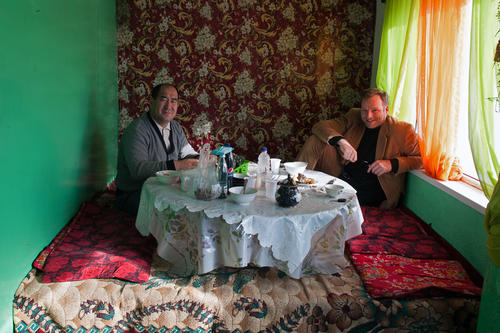Looking for Solutions – Forging Peace
In the politically fragile republics of the northern Caucasus, scholars from Freie Universität have initiated an extensive teaching project on conflict studies.
Mar 17, 2017
Talking about peace: Jan Koehler (at right) speaks to Kanybek Abduvasitovich Isakov, the rector of Osh State University in southern Kyrgyzstan, about ethnic tensions in the region.
Image Credit: Jan Koehler
In the north of the Caucasus region, between the Black Sea and the Caspian Sea, geography gets tricky. Georgia borders southern Russian republics with complicated names there, and in between lie autonomous regions such as Abkhazia, South Ossetia, and Adjara, remnants of complex conflicts following the breakup of the Soviet Union.
Their international status is often disputed, and the security situation in the region is unstable. Conflict studies researchers find a wealth of material here. Jan Koehler and Michael Daxner are working to make sure that those studying these issues come from the local area itself, if at all possible, and that conflict studies is a discipline practiced at local universities.
Koehler, who has a doctorate in social and cultural anthropology, and Daxner, a professor emeritus of sociology and higher education, have established a master’s degree program and a graduate school in Nalchik, the capital of Kabardino-Balkar Republic, in southern Russia. The two scholars from Berlin, whose research at Freie Universität includes subjects such as conflicts in Afghanistan, hope to arrive at new insights – and that their activities will help counteract the spread of conspiracy theories.
The idea of teaching conflict studies in the northern Caucasus came up more than ten years ago, when Koehler and Daxner were there, studying the consequences of the breakup of the Soviet Union. “We had sucked up so much knowledge from the region,” Koehler explains. “So then we asked ourselves, how can we give something back?”
Students of Today – Decision Makers of Tomorrow
“Institution Centered Conflict Studies” is the matter-of-fact title of the program, which has already received funding from the well-known Volkswagen Foundation twice. Koehler and Daxner have established four teaching modules relating to conflict studies at various universities in Russia, Georgia, and Kyrgyzstan. Students learn to analyze which players are involved, how institutions work, what role various resources play, and how history and geography affect conflicts. The goal is to approach conflicts with as little bias as possible.
One thing that is especially important to the scholars is for the students to do research themselves. These activities initially leave the major global conflicts out, instead starting small. For a typical teaching research project, Koehler says, students might travel to the Caucasian highlands, for example, to study a grazing conflict that, while apparently unremarkable, has already dragged on for several years. Students can observe who is influential in the local area, whether there are ties to the capital city, and whether there are official rules for settling the conflict.
“It is almost possible to unlock an entire society based on local conflicts that might seem banal at first,” Koehler says. “You learn a lot about how power works, and how it is restricted.”
Putting the methods they have learned into practice right away is new, and not just for local students. “We are doing pioneering work in terms of teaching in higher education here,” Daxner says. This approach, he explains, is especially important in the post-Soviet countries, where empirical social sciences have been neglected. “Most of the professors have never worked empirically themselves, so they have to learn how first,” Koehler says.
The modules have now been integrated into existing degree programs in many locations. The university in Nalchik has even established a master’s degree program and a graduate school based on the German model. Given the uncertain political situation, the cooperation with Freie Universität is unique, Koehler says.
He also points out that the only reason there is no resistance from the political sphere is because it is taking place at the academic level. But there is still great fear of Western influence, he explains. “Luckily, we’re not an NGO,” Koehler says. In that case, the researchers would definitely be unable to do what they are doing.
Koehler and Daxner hope universities across the northern Caucasus will form an international network. By financing more than 20 scholarships, they are helping to make it possible for postdocs, doctoral candidates, and students working toward a master’s degree to do research as a team on subjects such as identity, development, and governance. Up to four master’s degree students can also earn a degree from the University of Marburg, which offers an English-language program in conflict studies.
Training scholars in areas of smoldering conflict: Daxner and Koehler hope this will help improve the status of research on the region. But their project is also founded on the conviction that a better understanding of conflicts can help to cultivate peace.
“Even among government officials and politicians, there is a widespread view that social and political disputes are always somehow controlled by the intelligence services,” Koehler says. The students will cultivate a more nuanced view. “The United States is just not behind a grazing conflict,” Daxler explains. Because the students of today are tomorrow’s decision makers, this could help foster peaceful coexistence in the long term, he adds.
Further Information
- Jan Koehler, Institute for East European Studies, Freie Universität Berlin, Email: jkoehler@zedat.fu-berlin.de
- Prof. Dr. Dr. h.c. Michael Daxner, Otto Suhr Institute of Political Science, Freie Universität Berlin, Email: michael.daxner@fu-berlin.de

